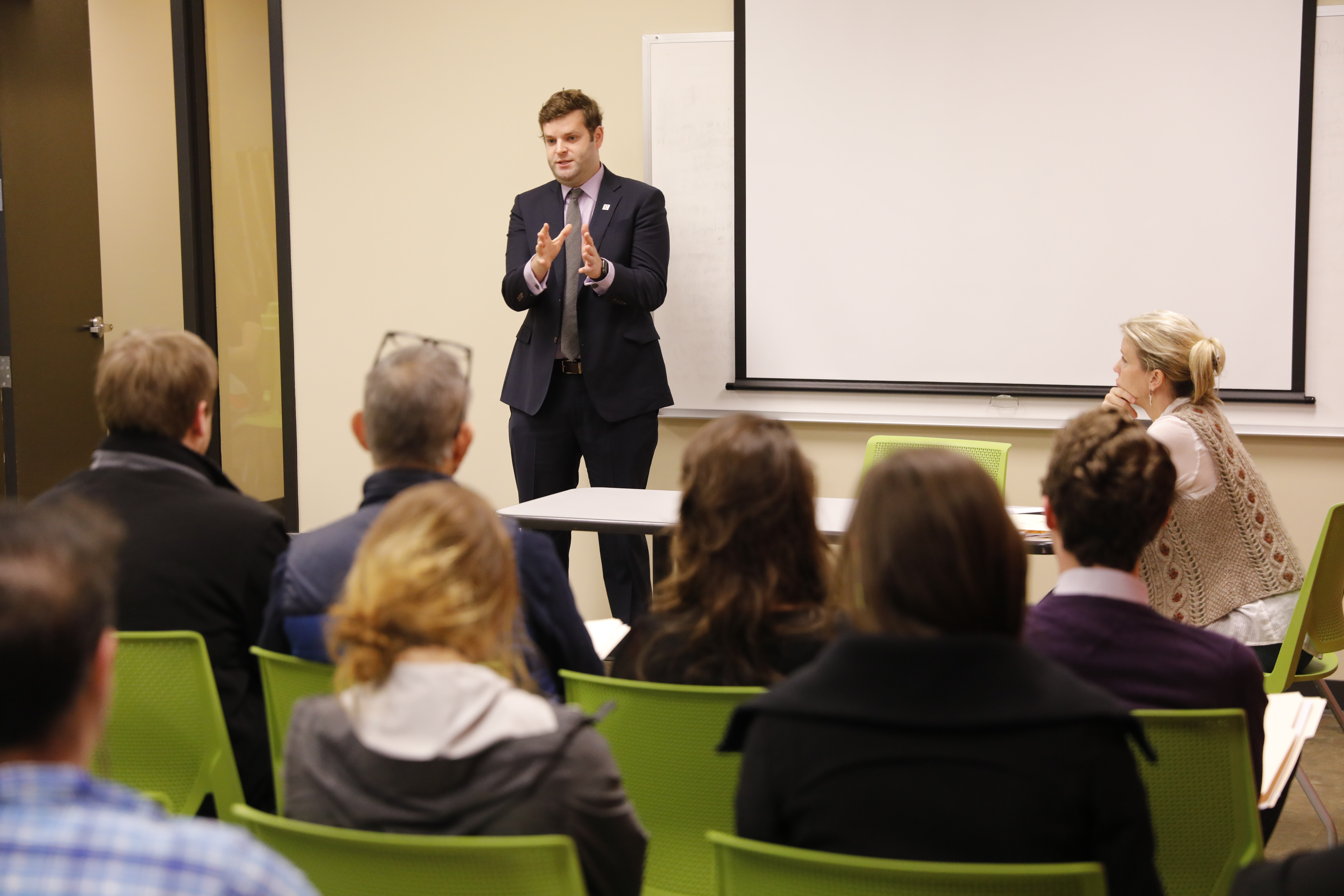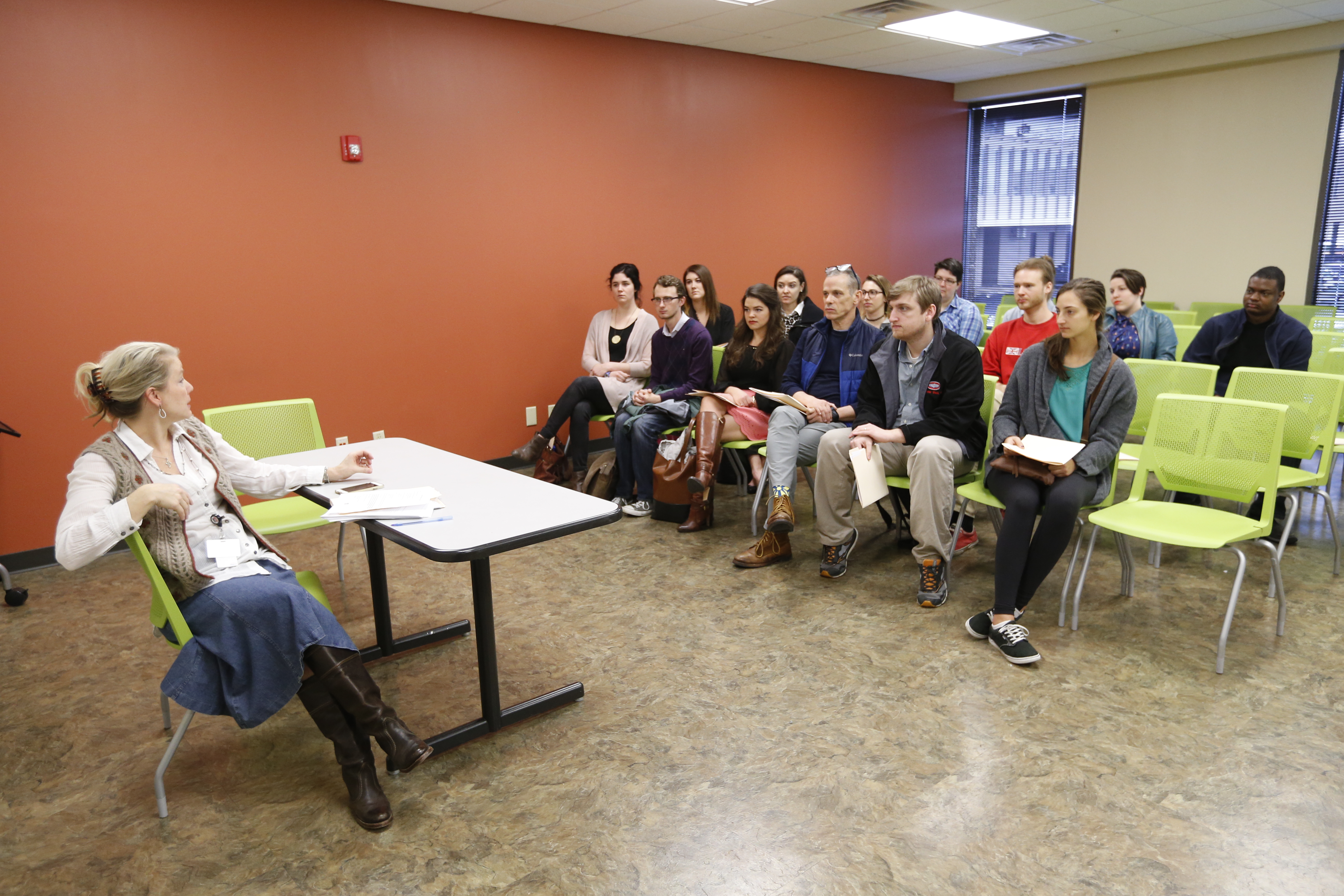Home » Justice, Mercy and Mass Incarceration » A Visit to the Public Defender’s Office and Courthouse
A Visit to the Public Defender’s Office and Courthouse
Posted by anderc8 on Tuesday, February 14, 2017 in Justice, Mercy and Mass Incarceration, News.
 The students and faculty from the University Course Justice, Mercy and Mass Incarceration went to the courthouse on February 7 to learn about the process of adjudication. As part of that experience, students and faculty met with members of the Public Defender’s Office. After a brief orientation, they broke into groups of 4-5 and headed to the courthouse, where they sat in courtrooms and witnessed the proceedings. They learned that 95 percent of cases are “pled out,” meaning they never go to trial. Instead, defendants are offered a plea deal. As part of that process, they typically plead guilty to a lesser charge than the one they were charged with. They also learned that over 85 percent of people charged with a crime have right to a public defender. This means that 85 percent of all people charged are below the poverty line. The experience in court demonstrated this fact: most people in the court were poor, people of color and/or immigrants. While the criminal code itself tends to criminalize poverty, it is also true that poor communities also experience higher rates of policing and therefore are more subject to criminal charges. These facts help account for the overrepresentation of poor people in the criminal justice system.
The students and faculty from the University Course Justice, Mercy and Mass Incarceration went to the courthouse on February 7 to learn about the process of adjudication. As part of that experience, students and faculty met with members of the Public Defender’s Office. After a brief orientation, they broke into groups of 4-5 and headed to the courthouse, where they sat in courtrooms and witnessed the proceedings. They learned that 95 percent of cases are “pled out,” meaning they never go to trial. Instead, defendants are offered a plea deal. As part of that process, they typically plead guilty to a lesser charge than the one they were charged with. They also learned that over 85 percent of people charged with a crime have right to a public defender. This means that 85 percent of all people charged are below the poverty line. The experience in court demonstrated this fact: most people in the court were poor, people of color and/or immigrants. While the criminal code itself tends to criminalize poverty, it is also true that poor communities also experience higher rates of policing and therefore are more subject to criminal charges. These facts help account for the overrepresentation of poor people in the criminal justice system.
Blog written by Vanderbilt University Law School student Amelia Montgomery
My main reaction to the court watch experience was frankly a feeling of defeat. I felt defeated and depressed at how hopeless our criminal court system seemed to be. There were two main aspects to this hopelessness. First, this hopelessness was partially driven by how inaccessible the criminal court system is to those who have the misfortune of moving through it. Second, my hopelessness was also a result of the degree to which money drives the criminal justice apparatus and the possession or lack thereof truly determines one’s outcome.
First, I want to address the inaccessibility issue. The court system is complicated and those who are assigned a public defender or an attorney from a conflict pool are basically without an adequate guide. This issue was hammered home by many experiences throughout the morning. First, after reading the hypothetical case aloud, the public defenders told us that the reason they heaped so much information on us in the hypothetical was to simulate the experience of one of their clients. The public defenders’ clients are given a great deal of information as to how the process will work and the choices they have to make without really having the time to process it. They may or may not have someone available to explain the ramifications of those choices to them, but often their advocate or judge may not know or may not have the time or frankly the level of concern to explain the consequences of their choices.
Then, wandering through the court building from room to room, and listening to our public defender guide, Adam Pienciak, explain the process showed me how complicated the criminal adjudication procedure is. Even as a 3rd year law student, it was difficult for me to follow the process that a felony or misdemeanor charge would go through on its path to a conviction or dismissal. It seems to be almost set up to be enigmatic. It would be nearly impossible for a pro se litigant to navigate.
Adam also explained that many judges misbehave or are excessively harsh on minor infractions such as parole violations. Judges also may leave by 11 a.m. or 12 p.m., and are anxious to do. Are they really giving full consideration to their cases or making a hasty decision to get one more case done before noon?
Finally, very few defendants in this system are getting the representation they are entitled by the Constitution. 85 percent of defendants qualify for public defense, but public defenders cannot take on all of these cases. The rules of professional conduct which set forth standards for the legal profession dictate (in the very first Model Rule) that lawyers shall provide competent representation to clients. Two factors to consider with regard to competence are thoroughness and preparation, neither of which the public defenders are able to provide when they must handle as many as 20 cases in one day. Technically, such a violation could lead to consequences such as public reprimand or even disbarment. Adam told me that this rule was one of the reasons that the public defenders are capping the number of cases they take.
The second factor that renders the criminal justice system broken is that successful navigation really requires money. First of all, if you had money you could hire an attorney with sufficient time and experience to truly build a case for you. Second, if you have money you can make bail, rather than sit in a jail cell until you either plead guilty (with all of its attendant consequences) or until a trial that could be over a year away. Third, if you have enough money, you basically have more options available to you than just going to jail for your crime. Being on probation requires constant payments – to your probation officer, for your drug tests, for transportation to meet with your officer and take drug tests, to pay for child care while you go do these things, to take whatever classes the judge has mandated that you take, etc.
It is truly unfortunate that our criminal justice system has become so unfair and so complex. It seems to me that these are problems that small tweaks will not fix, and that it is rather an overhauling that is needed. As the public defenders pointed out, eliminating or replacing the money bail system would be one such overhaul. I think that also the consequences of and incentives to pleading guilty should be revamped. Perhaps an entirely different system could be created for minor crimes, especially those that do not involve violence. You should not be able to pay your way out of a punishment, and you should not be subjected to more punishment out of inability to pay either. The system we have now takes those who are already disadvantaged and disadvantages them further.

